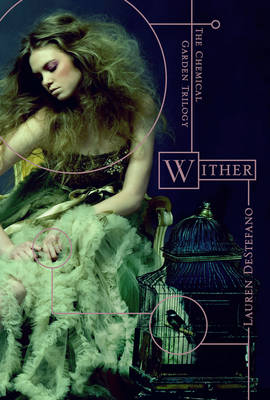Reviewed by Briana @ Pages Unbound on
Most of the story, however, is not focused on this search for a miracle. Instead, it closely follows protagonist Rhine as she is sucked into the alien world of the wealthy, who are eager to spend fortunes on stunning home illusions and parties in an attempt to enjoy their lives while they last. DeStefano’s depiction of the luxurious world is imaginative and captivating, as tempting to readers as it is to Rhine. She must continuously struggle against the life that has been forced upon her, always remember that beyond the endless gardens and orange grove and course for miniature gulf, that she once had a different home, one with family if without wealth.
She begins to find, however, that it may be possible to build a different sort of family. One with her sister wives and the servants, if not with the House Governor, her husband, whom she is determined to hate. The relationships that develop between the girls are complex, sometimes strained but sometimes moving. The fact that they are in a polygamous relationship can occasionally escape the reader’s memory because they spend so much time together trying to be friends. This is doubtless the result of a concerted effort by DeStefano to soften an incredibly creepy plot aspect. Her other main endeavor to make the polygamy palatable is evident in Rhine’s consistent refusal to actually have intercourse with her husband. Nonetheless, their strange sister wife relationship to each other and to their husband is disturbing.
It may honestly be the most disturbing facet of the book. In many ways, DeStefano fails to deliver on her dystopian/post apocalyptic ideas, and her world ends up inconsistent. For instance, readers may wonder why, if women are in such high demand, they are frequently murdered. Or why women must be kidnapped to be brides. Or why only the upper classes are eager to reproduce. Or why no one bothers with education anymore if they really want to find a cure. Or even what purpose it serves to the plot for North America to be the only continent left in existence. (Perhaps this is supposed to be an easy solution to the question of how everyone in the world, including very poor countries, would have all turned to genetic engineering so quickly?) Answers are not forthcoming, and the lack of explanations makes Wither less believable and therefore less powerful.
The level of potential fear is also diminished by the fact that there is absolutely no hint as to what evil deeds Rhine’s father-in-law is supposedly up to in the basement. He is doing something—he is murderous and controlling and has corpses he of people he claims had been cremated—but without an idea of what his experiments are (besides the fact that they must evil), readers cannot be overly concerned about them. One can only imagine that the whole mystery will be cleared up later in the series, but by the ending of the Wither, it seems though an interesting plot turn will have to occur for that reveal even to happen.
Wither is unique and rather fascinating. It is filled with a cast of strong and unforgettable characters. Its most obvious characteristic, however, is its failure to live up to its own potential. The plotline, concept, and relationships are enough to lead readers to the sequel Fever—after all, who wants to leave a story without discovering whether the human race survives?—but there are so many ways by which readers could have been made even more eager to find out what happens.
This review was also posted at Pages Unbound Book Reviews.
Reading updates
- Started reading
- 16 March, 2012: Finished reading
- 16 March, 2012: Reviewed
